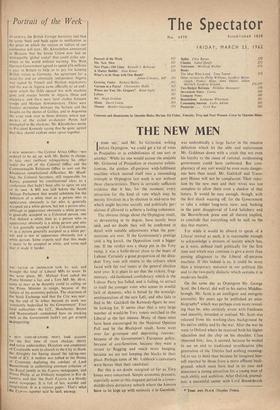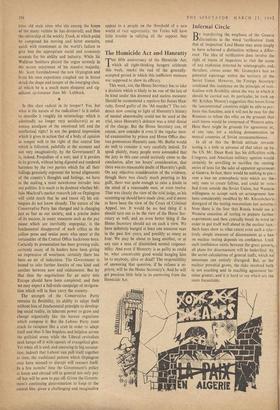THE NEW MEN
(DARE say,' said Mr. Jo Grimond, writing before Orpington, 'we could get a lot of votes as Poujadists or as exhibitionists of one sort or another.' While no one would accuse the amiable Mr. Grimond of Poujadism or excessive exhibi- tionism, the aimless all-purpose wish-fulfilment machine which steered itself into a resounding triumph at Orpington last week is not without these characteristics. There is certainly sufficient evidence that it has, for the moment, every attraction for the kind of vote which may be merely frivolous in a by-election in mid-term but which might become socially and politically per nicious if allowed to achieve a lasting coherence.
The obvious things about the Orpington result, so devastating in its degree, have mostly been said, and no doubt they will be confirmed in detail with suitable adjustments when the post- mortems are over. If the Government's prestige took a big knock, the Opposition took a bigger one. If the verdict was a sharp pin in the Tory rump, it was a knife-thrust close to the heart of Labour. Certainly a great proportion of the dissi- dent Tory vote will return, to the colours when faced with the real issues at the general election next year. It is plain to see that the rickety, frag- mentary, old-fashioned confederacy which is the Labour Party has failed, and is failing, to attract to itself the younger voter who senses its woeful lack of dynamic, who is bored by the nostalgic sentimentalism of the new Left, and who fails to find in Mr. Gaitskell the Kennedy-figure he may be looking for. It seems clear that a very large number of would-be Tory voters switched to the Liberal at the last minute. Many of them mUst have been encouraged by the National Opinion Poll and by the Blackpool result. Some went over for grotesque and depressing reasons: because of the Government's European policy, because of anti-Semitism. because they want a return to flogging and much more hanging, because we are not keeping the blacks in their place. Perhaps some of Mr. Lubbock's canvassers were fiercer than their candidate.
But this is no doubt marginal so far as Ti ry losses were concerned. Simple economic pressure, especially acute at this stagnant period in a lower- middle-class dormitory suburb where the Joneses have to be kept up with seriously a la Gambols, was undoubtedly a large factor in the massive defection which let the able and unfortunate Mr. Goldman down with a crash that not even his loyalty to the cause of rational, modernising government could have cushioned. But com- placency of any sort would be even more danger- ous here than usual. Mr. Gaifskell and Trans- port House will not be complacent. Their rejec- tion by the new men and their wives was too complete to allow them even a shadow of that luxury. It would be easy enough, though, with the first shock wearing off, for the Government to take a milder long-term view; and, basking in the joint disapproval of Lord Salisbury and the Beaverbrook press and all therein implied, to conclude that, everything will be well on the day that matters.
For while it would be absurd to speak of a Liberal revival as such, it is reasonable enough to acknowledge a stratum of society which has, as it were, defined itself politically for the first time and which may continue to give a more than passing allegiance to the Liberal all-purpose machine. If this indeed is so, it could be more than a temporary nuisance in our political life and to the two-party dialectic which sustains it in moderate health.
On the same day as Orpington Mr. George Scott. the Liberal, did well in his native Middles- brough. Mr. Scott is an intelligent and energetic journalist. Six years ago he published an auto- biography* which was perhaps even more reveal- ing than he, who certainly wrote with frankness and sincerity, intended or realised. Mr. Scott was released from his working-class background by his native ability and by the war. After the war he went to Oxford where he received both his higher education and the chip on his shoulder. Class obsessed him: less, it seemed, because he wished to see an end to traditional stratification (the generation of the Thirties had nothing meaning- ful to say to him) than because he imagined him- self rejected by those from a more affluent back- ground. which must have had in its ease and assurance a strong attraction for a young man of such ability and ambition. After Oxford, journal- ism: a successful career with Lord Beaverbrook • TIME AND PLACE (Staples Press).
(that old male siren who sits among the bones of the many victims he has devoured); and then the editorship of the weekly Truth, at which point he composed his moving and bitter memoirs, quick with resentment at the world's failure to give him the appropriate social and economic rewards for his ability and industry. While Sir Waldron Smithers played the organ serenely in the secure enjoyment of his massive majority, Mr. Scott foreshadowed the new Orpington and from his own experience roughed out in broad detail the shape and temper of the emerging class, of which he is a much more eloquent and sig- nificant spokesman than Mr. Lubbock.
Is this class radical in its temper? Yes, but what is the nature of the radicalism? Is it unfair to describe it roughly (in terminology which is admittedly no longer very satisfactory) as an uneasy amalgam of the emotional left and the intellectual right? Is not the general impression which it gives in action that of a body of opinion in temper well to the right of that central line which is followed, painfully at the moment and not very imaginatively, by the Government? It is, indeed, Poujadism of a sort; and if it persists in its growth, without being digested and rendered harmless by the two parties which for all their failings genuinely represent the broad alignments of the country's thoughts and feelings, we have in the making a most unwelcome intruder into our politics. It is much to be doubted whether Mr. lain Macleod's market research job on Orpington will yield much that he and (most of) his col- leagues do not know already. The nature of the Conservative Party has changed and is changing just as fast as our society, and a precise index of its success, in many measures such as the pay pause which are inevitably unpopular, is the fundamental disapproval of such critics as the yellow press and senior peers who sneer at the tortuosities of the Central Office backroom boys. Certainly its presentation has been growing stale, certainly many of its leaders have been giving an impression of weariness, certainly there has been an air of indecision. The Government is bound to take further knocks of one kind and another between now and midsummer. But by that time the negotiations for an entry into Europe should have been completed, and then we may expect a full-scale campaign of invigora- tion which will in time carry the country.
The strength of the Conservative Party remains its flexibility, its ability to adapt itself without loss of fundamental principle to develop- ing social reality, its inherent power to grow and change organically like the human organisms which compose it. But the Labour Party must crack its carapace like a crab in order to adapt itself and thus it lies hopeless and helpless across the political arena while the Liberal revivalists peck lumps of it with squeals of evangelical glee. Yet when all is said, and assuming (a big assump- tion, indeed) that Labour can pull itself together in time, the traditional pattern which Orpington may have seemed to disrupt will reassert itself. In a few months' time the Government's policy at home and abroad will in general not only pay off but will be seen to pay off. Given the Govern- ment's continuing determination to keep to the central line, given a challenging and imaginative appeal to a people on the threshold of a new world of vast opportunity, the Tories will have little trouble in rallying all the support they need.



































 Previous page
Previous page